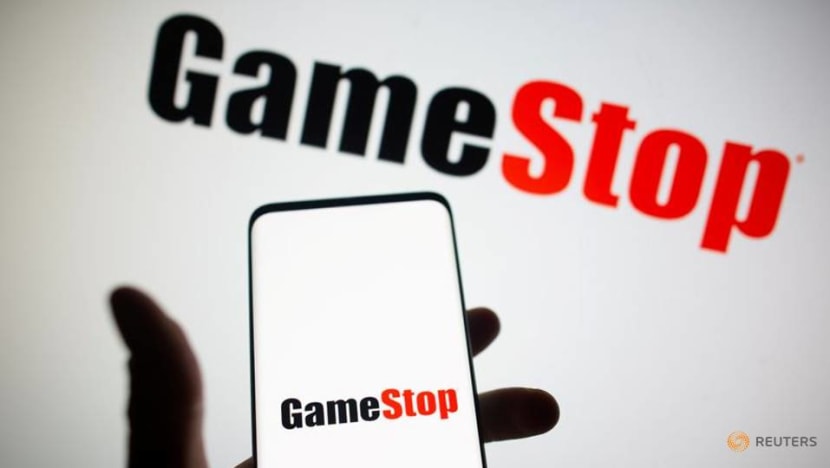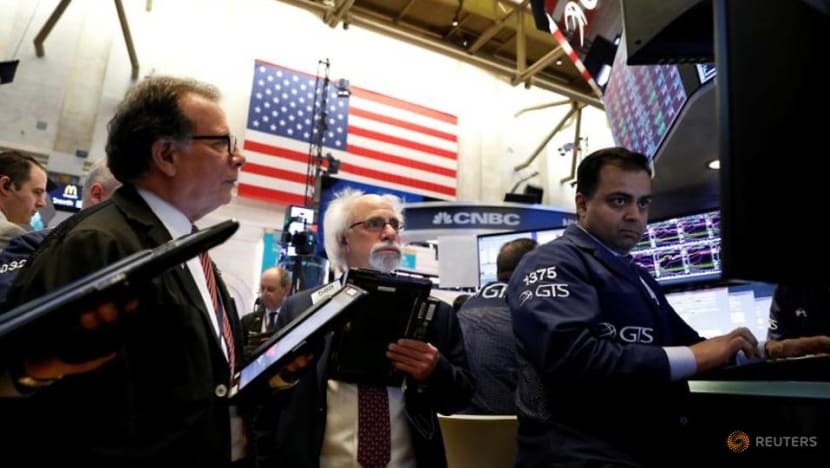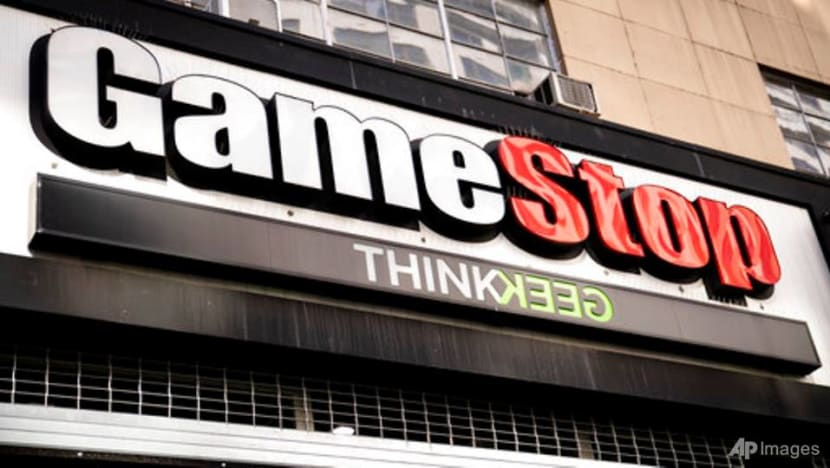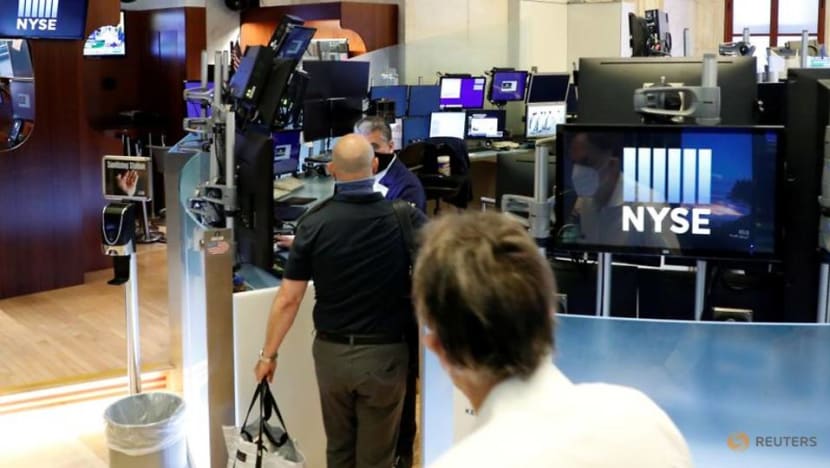commentary Commentary
Commentary: GameStop insanity has painful lessons on short-selling and more for retail investors
While the story has been framed as a modern David versus Goliath tale, the incident underscores the need to educate retail investors of investment risks, says NUS Asian Institute of Digital Finance’s Emir Hrnjic.

GameStop logo is seen in this illustration taken Febr2, 2021. (Photo: REUTERS/Dado Ruvic/Illustration)
SINGAPORE: In the recent battle on Wall Street, retail investors soundly defeated hedge fund billionaires at their own game and decimated hedge fund Melvin Capital Management to the tune of several billions of dollars.
A group that initiated this battle and declared war on Wall Street – Reddit’s WallStreetBets forum – doubled its membership to more than 6 million members in just a week.
In a sign of support, the progressive US Representative Alexandria Ocasio-Cortez said: Everyday people were finally able to proactively organise and get back at the folks that have historically had all the marbles on Wall Street.
With memories of the Great Recession still fresh in their minds, average people around the world celebrated this rare win of David over Goliath.
READ: GameStop's stupefying stock rise doesn't hide its reality
But was that really the case? And what really happened?
BATTLEFIELD GAMESTOP
A video game retailer GameStop has become the centre of a battle between an army of retail investors and hedge funds over the past month.
Amid an overall economic slowdown and a gradual shift to digital gaming, GameStop has announced closing hundreds of stores due to a stark drop in sales.
In mid-2020, new leadership took over the company. Yet in 2021, the company with declining prospects, but promising new leadership, found itself in the middle of heavy short selling by hedge funds.
Short selling is a very risky strategy. When shares of the company are heavily shorted and the share price starts going up, short sellers are forced to close their positions and buy shares at higher prices, thus creating buying pressure.

Moreover, rising prices trigger margin calls creating even more pressure on short sellers. This leads to a self-reinforcing loop and a so-called “short squeeze”.
Enter Reddit’s WallStreetBets forum – a community of self-proclaimed “degenerates” who treat stock markets like casinos and feel a sense of responsibility to stand up to financial institutions that have rigged the system.
These renegade retail investors self-organised and started investing against institutional investors – self-proclaimed “smart money”.
They started promoting GameStop and encouraging members to buy its shares in a potential ramping scheme designed to artificially inflate the share price and create a short squeeze.
READ: Commentary: Reddit investors, GameStop and the new Occupy Wallstreet movement
In the second half of January, price of GameStop went from U$20 to more than US$300, for a more than 1,500 per cent return, while decimating short sellers in process.
Melvin Capital Management suffered billions of dollars of losses, while losing more than 50 per cent of its value in January and had to be rescued. Short sellers’ losses amounted to almost U$20 billion – more than the market cap of GameStop.
DAVID VERSUS GOLIATH?
Business press promoted a simplified version of the story and labelled it the battle of David versus Goliath. But there is more to the story.
Some data suggests that sophisticated investors with access to plenty of capital joined the buying side.
In fact, even after broker apps like Robinhood banned retail buying, thus cutting retail investors’ main access to shares of GameStop, buying pressure continued.

While media reports continued the narrative that retail traders were buying frantically and retail sentiment kept the buying pressure, Bloomberg reported Citadel Securities’ retail flow which looked pretty balanced.
In other words, retail investors were buying and selling in equal amounts. In fact, they were net sellers for most of the last week.
Moreover, GameStop’s largest shareholders were Wall Street powerhouses Fidelity Investments and BlackRock.
If anything else, GameStop’s fever may have initially resembled a conventional pump-and-dump scheme that might have started on WallStreetBets’ forum, but was likely supported by much more sophisticated and wealthier investors.
READ: Commentary: Has Razer found a new way to reach profitability?
WHAT IS NEXT?
Many wonder how this will end. What is the exit strategy for GameStop shareholders?
Remember, retail investors started buying GameStop shares to put pressure on the share price and force short sellers to cover their positions, creating a self-reinforcing buying pressure and, thus, a short squeeze. A typical short squeeze often leads to a price bubble whereby stock prices are not supported by fundamentals.
As is typical in bubbles, some investors are buying out of conviction that the price will keep rising. Even if investors understand that they are buying at inflated prices, they are likely hoping to sell them to “a greater fool” at even higher prices later.

Nevertheless, when all shorts get covered, investors will be stuck with an inferior dividend yield, depressed cash flows, and no incentive to hold.
As it becomes clear that prices are above prices justified by any fundamental pricing model, investors will find themselves holding overpriced securities. At that point, collective action will likely fail and some shareholders will start realising gains by selling overpriced shares.
Once the exodus starts, the price will collapse to a more reasonable level. While early investors would have made hefty profits, late-comers to the party are in for a rude awakening.
READ: Commentary: Is the stock market’s rise driven by mania or logic?
READ: Commentary: Here’s why stock markets are defying the economic reality of COVID-19
At time of writing, GameStop’s price has plunged from a high of US$325 to US$90 a share, where it has stayed for the last two days.
And while some small investors might have won in the short run, investing based on social media posts is a bad investment strategy which will likely lead to an inferior performance in the long run.
A VALUABLE LESSON
But some good came out of this episode. GameStop incident attracted unprecedented media attention to short selling and risks of investing in the stock market. The event highlighted a chief need to better educate retail investors about the investing risks.
However, it is not clear that we can rely on the media for investor education. Extremely popular podcast host Joe Rogan created a video about GameStop in which he said:
It’s all so weird … because the stock market has always been this weird number thing that is based on confidence.
With 4.6 million views of this episode on YouTube alone in just five days, this statement highlights the current (mis)understanding of the issue.
If none of what happened with GameStop made sense to you, listen to financial veterans break down how different players powered the surge and which listed company could see copycat attacks in CNA's Heart of the Matter podcast:
Emir Hrnjic is Head of FinTech Training at Asian Institute of Digital Finance (AIDF), National University of Singapore (NUS). The opinions expressed are those of the author and do not represent the views and opinions of AIDF or NUS.















